

11_ TEAL_Adult_Learning_Theory. The Adult Learning Theory - Andragogy - of Malcolm Knowles. Malcolm Shepherd Knowles (1913 – 1997) was an American educator well known for the use of the term Andragogy as synonymous to adult education.
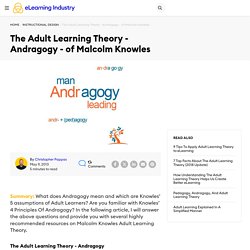
According to Malcolm Knowles, andragogy is the art and science of adult learning, thus andragogy refers to any form of adult learning. (Kearsley, 2010). The term andragogy can be supposedly equivalent to the term pedagogy. Andragogy in Greek means man-leading in comparison to pedagogy, which in Greek means child-leading. However, it should be noted that the term pedagogy has been used since the Ancient Greek times, while Alexander Kapp, a German educator, first used the term andragogy in 1833.
Teaching and Learning Resources / Andragogy. Just as there is no one theory that explains how humans learn, no single theory of adult learning has emerged to unify the field.
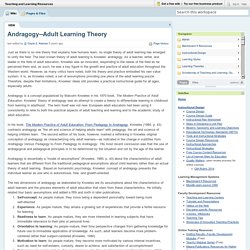
The best known theory of adult learning is Knowles’ andragogy. As a teacher, writer, and leader in the field of adult education, Knowles was an innovator, responding to the needs of the field as he perceived them and, as such, he was a key figure in the growth and practice of adult education throughout the Western world. However, as many critics have noted, both his theory and practice embodied his own value system. Learning Theories/Adult Learning Theories. Overview[edit] Typical adult learning theories encompass the basic concepts of behavioral change and experience.
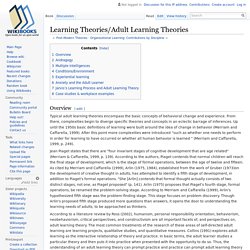
From there, complexities begin to diverge specific theories and concepts in an eclectic barrage of inferences. Up until the 1950s basic definitions of learning were built around the idea of change in behavior (Merriam and Caffarella, 1999). After this point more complexities were introduced “such as whether one needs to perform in order for learning to have occurred or whether all human behavior is learned ” (Merriam and Caffarella, 1999, p. 249). Jean Piaget states that there are "four invariant stages of cognitive development that are age related" (Merriam & Caffarella, 1999, p. 139). Model of Adult Learning Theory Process. Adult Learning Theory Teaching Adults IsDifferent fromTeaching Children When we were children most of us had teachers whoknew much more than we.
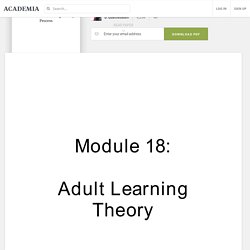
These teachers usuallytold us what to learn. As adults, we may not know asmuch as the teacher, but we have a lot of experiencesand we often want to talk about what we know anddecide what we would like to learn.The ways we teach children thus may not work well for adults. Definition. Adult Learning Theory (Andragogy) - Educational Learning Theories. Dr.
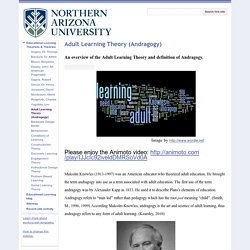
Knowles gave adult learners 5 characteristics: 1. Self-concept: As a person matures his self concept moves from one of being a dependent personality toward one of being a self-directed human being 2. Experience: As a person matures he accumulates a growing reservoir of experience that becomes an increasing resource for learning. 3. 4. 5. Photo source: www.halloffame.outreach.ou.edu.
The Adult Learning Theory - Andragogy - Infographic. Teaching College Courses Online vs Face-to-Face. Teaching College Courses Online vs Face-to-Face Experiencing a huge demand for college courses taught over the Web and not wanting to be swept aside by competitors from the commercial sector, universities are often pressuring faculty to teach courses online.
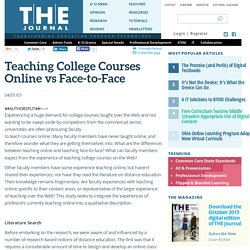
Many faculty members have never taught online, and therefore wonder what they are getting themselves into. Theories of Learning. Learning is one of the most important activities in which humans engage.
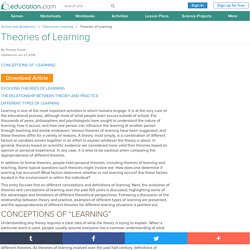
It is at the very core of the educational process, although most of what people learn occurs outside of school. For thousands of years, philosophers and psychologists have sought to understand the nature of learning, how it occurs, and how one person can influence the learning of another person through teaching and similar endeavors. Various theories of learning have been suggested, and these theories differ for a variety of reasons. A theory, most simply, is a combination of different factors or variables woven together in an effort to explain whatever the theory is about.
In general, theories based on scientific evidence are considered more valid than theories based on opinion or personal experience. Learning theories and online learning. Untitled. Unit 1: The Adult Learner. 8 Important Characteristics Of Adult Learners. Adults are characterized by maturity, self-confidence, autonomy, solid decision-making, and are generally more practical, multi-tasking, purposeful, self-directed, experienced, and less open-minded and receptive to change.
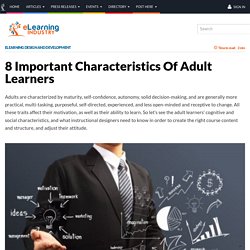
All these traits affect their motivation, as well as their ability to learn. So let’s see the adult learners' cognitive and social characteristics, and what instructional designers need to know in order to create the right course content and structure, and adjust their attitude. Self-directionAdults feel the need to take responsibility for their lives and decisions and this is why it’s important for them to have control over their learning. What other characteristics of adult learners would you like to add? You may also find useful the: Least but not last, I highly encourage you to see the following short video from the PC3 team focusing on Malcolm Knowles' theory of andragogy or adult learning.
Get 2 Free eBooks Get the eLearning Industry's Articles in your inbox. Ten Characteristics Adults Learners. Characteristics of Adult Learners. SumoMe When it comes to learning, adults are not over sized children.
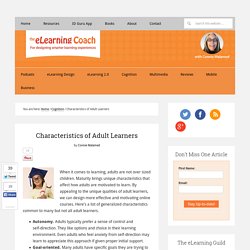
Maturity brings unique characteristics that affect how adults are motivated to learn. Research on Adult Learners: Supporting the Needs of a Student Population that Is No Longer Nontraditional. Adult students have been a growing presence on college campuses during recent decades and there are numerous indicators that these students, often referred to as “nontraditional,” constitute a significant proportion of the undergraduate student body.
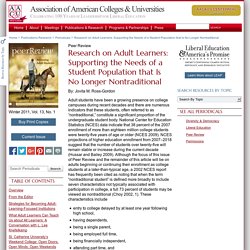
National Center for Education Statistics (NCES) data indicate that 38 percent of the 2007 enrollment of more than eighteen million college students were twenty-five years of age or older (NCES 2009). NCES projections of higher education enrollment from 2007–2018 suggest that the number of students over twenty-five will remain stable or increase during the current decade (Hussar and Bailey 2009). Entry to college delayed by at least one year following high school,having dependents,being a single parent,being employed full time,being financially independent,attending part time, andnot having a high school diploma. K. Adult Education Toolkit Updated 022814. Characteristics of Adult Learners. Patient Education: Learning readiness.
Learning readiness refers to how likely a person is to seek out knowledge and participate in behavior change. Individuals go through various stages in order to adopt or maintain a new health behavior. In the pre-contemplative stage, the person is generally not aware of a problem or not ready to act. In the contemplative stage, the person is thinking about a change, but is not yet taking action.
In the action stage, the person adopts a behavior change and is practicing it. In the maintenance stage, the person retains the new behavior as a result of reinforcement. Many factors influence a patient’s readiness to learn. Professional Development: Teaching Strategies. Teaching Strategies Now that we have learned more about the characteristics of adult learners and explored the differences between youth and adult learners, let's learn more about how we can use that information in our classrooms.
Click on each link to learn more about teaching strategies appropriate for adult learners. Ask what they want to learn: Because adults are relevancy oriented, it is important to get the participants perspectives about what topics they want to cover. You can do this by simply asking the adult learners what they hope to learn or gain from the class. Who is the Adult Learner? Adult learners are a very diverse group (typically ages 25 and older) with a wide range of abilities, educational and cultural backgrounds, responsibilities and job experiences.
The Nebraska Institute for the Study of Adult Literacy summarizes assumptions about the adult learner based on the research of John Dirkx and Ruth Lavin and Sol Pelavin's The Adult Learner Model. Adult learners typically: Do not follow the traditional education pattern of leaving high school and enrolling immediately in some type of postsecondary education; Enroll in certificate programs and non-degree programs such as literacy, basic skills, work-skills training and degree programs at colleges and universities; Pursue studies on a part-time basis, taking one or two courses a term while maintaining work and family responsibilities; and Seek alternative delivery systems, in particular online learning, which frees them from challenges of time and location-based classroom activity. 1 U.S. Paulo Freire: dialogue, praxis and education. Contents: introduction · contribution · critique · further reading and references · links Paulo Freire (1921 – 1997), the Brazilian educationalist, has left a significant mark on thinking about progressive practice.
His Pedagogy of the Oppressed is currently one of the most quoted educational texts (especially in Latin America, Africa and Asia). Freire was able to draw upon, and weave together, a number of strands of thinking about educational practice and liberation. Sometimes some rather excessive claims are made for his work e.g. ‘the most significant educational thinker of the twentieth century’. Contribution. JOTS v26n2 - Pedagogy vs. Andragogy: A False Dichotomy? Understanding Adult Learners’ Needs. Understanding learner needs is essential for providing quality education. One approach for accomplishing this is through the use of student evaluations. A common argument against the use of student evaluations is that students do not know their own needs.
However, many studies have shown student feedback/suggestions to be reliable and valid. If we do not even attempt to understand their needs, we may fail to recognize the support they require to be successful. Teaching Strategies for Adult Learners. January 25th, 2012. Training and the Needs of Adult Learners. What I Learned from Teaching Adult Learners Online. One summer, I was asked to take over an online course (in a master of education program) that had already begun. I accepted the job, but with hesitation.
I knew the course material because it was within my field of expertise, but I had never taught an online course or taught masters-level students. I asked a colleague for help in determining what course material to use. Idea Paper 29. Teaching Techniques that Motivate Adult Learners. As an instructor, you realize the importance of making the classroom experience meaningful for all students, and you strive to ensure that each one has the opportunity to feel and be successful as a result of taking your course. Therefore, as the term begins, you’re likely considering how you can create a learning environment that proves relevant to all who enter. As one example: many of the students you teach probably fall under the umbrella of the “traditional” student, who matriculated in college directly after high school.
BusyTeacher.org Mobile. A lot of teachers will find they have to teach younger people however many more will also be teaching adults. Teaching Strategies for Adult Learners.